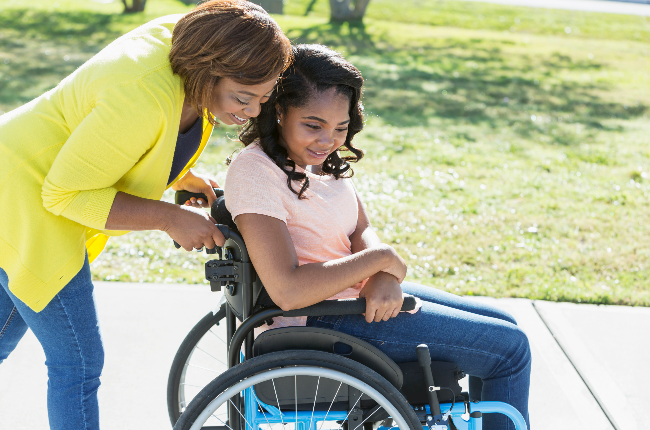
For any parent, finding out that your child has a disability can be hard to come to terms with. However, coping is possible if you seek help to manage your emotions and work towards accepting the situation. It is important for you to have knowledge of the disability your child has and also understand their needs.
EMOTIONAL STRUGGLES A PARENT GOES THROUGH
Finding out that your child will live with a disability is a painful experience. Thembi Tshabalala, the founder of Nkanyezi Stimulation Centre in Soweto, went through all the emotions which could have left her broken when her late son, Nkanyezi, was diagnosed with cerebral palsy.
“The doctors did not tell me anything. As Nkanyezi was growing, I noticed that his development was strange,” she says. She took it upon herself to find out what was wrong with her child and her son was diagnosed with cerebral palsy and epilepsy.
“I remember standing in the middle of the dining room and asking myself how I was going to face the world with this child. But God gave me strength. On that day, I took it upon myself to know more about my child’s disability,” she says.
WHAT YOU MIGHT GO THROUGH
You will experience a number of emotions after learning that your child has a disability, which will include:
- Anger: You might go through strong emotions of anger at the world, doctors and even God. You might even ask yourself why you.
- Blame: You might blame yourself for whatever disability your child has and feel like you could have done something to prevent it.
- Rejection: Mothers are often rejected by families, society and even the fathers.
COMMON DISABILITIES IN CHILDREN
Cerebral palsy: It’s a long-term physical condition that poses a problem in movement of muscles and exercising of motor control. It's caused by brain damage in the foetus or child and can be the result of a vast number of factors including infections, stroke, or physical head trauma.
Down syndrome: It is one of the most common genetic disorders and affects people from the time of their birth. A person living with it may display delays in physical and cognitive growth.
Dyslexia: It is a disorder that inhibits the process of learning to read with fluency and lucidity. If identified early, it can be dealt with.
Attention Deficit Disorder (ADD): Children who have ADD are easily distracted and have trouble paying constant attention.
Fetal alcohol syndrome: This syndrome is a result of the consumption of large amounts of alcohol during pregnancy. The consumption of alcohol by the mother can cause severe damage to the brain of the foetus because the growth of the child’s brain takes place throughout the pregnancy.
Autism: A child who has autism has trouble making effective verbal or non-verbal communication. The child finds it difficult to socialise efficiently and their behaviour may be a little difficult to decipher. In some cases there may be learning difficulties.
WHAT TO DO WHEN YOU FIND OUT YOUR CHILD HAS A DISABILITY
- Acceptance: Try to accept the situation you have found yourself in because it will only frustrate you and leave you in a state of misery if you don’t.
- Knowledge: Find out more about your child’s disability and ask questions so that you can best take care of him or her.
- Love: Don’t neglect or hate your child because of how they are. Be a parent and take care of them.
- Support: Find a support group. There are other parents who are going through similar situations as you.
CHALLENGES YOU MAY FACE
Thembi says there are a lot of challenges that are faced by mothers, as the responsibility of taking care of the child lies with them. “Financially, it is difficult to cope with the demands of a child living with a disability. It was really hard from me, but I trusted God to provide and His grace got me through it. Mothers struggle to find centres that take care of children living with disabilities because they are few or out of reach.”
WHY THERAPY IS IMPORTANT
My Child Without Limits, an international organisation that advocates for the well-being of children living with disabilities and is passionate about helping parents take care of their children, gives a list of different treatments available for children with disabilities:
Behavioural therapy: Behaviour therapy is a type of psychotherapy that focuses on reducing behavioural problems and promoting adaptation skills. It uses psychological techniques to improve physical, mental and communication skills.
Cognitive therapy: Cognitive therapy is the opposite of behavioural therapy. Cognitive therapy focuses primarily on the thoughts and emotions that lead to certain behaviours, while behavioural therapy deals with changing and eliminating those unwanted behaviours.
Drug therapy: Drug treatments will depend on what medical practitioners recommend.
Physical therapy: Physical therapy, sometimes called physiotherapy, focuses on improving gross and fine motor skills, balance and coordination, strength and endurance. Your child will be evaluated by a physical therapist to assess muscle and joint function, mobility, strength and endurance, oral motor skills such as feeding and talking, posture and balance, even the status of the heart and lungs.
Occupational therapy: Occupational therapy is a treatment therapy that helps people achieve independence in all facets of their lives. If your child has physical disabilities or developmental delays, occupational therapy can improve their cognitive (thinking), physical and motor skills, as well as address psychological, social and environmental factors that impact your child’s functioning.
Speech therapy: Speech therapy is a clinical programme aimed at improving speech and language skills and oral motor abilities. This means talking, using sign language or using a communication aid. Children who are able to talk may work on making their speech clearer or on building their language skills by learning new words, learning to speak in sentences or improving their listening skills.


















